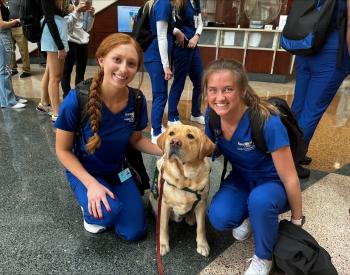

On paper, Justin Gadberry’s career is a puzzle.
How does a 37-year-old U.S. Army paratrooper and combat veteran with two tours of duty and an MBA, former industrial salesman and current Army Reserve Major end up working as a graduate nurse in the Primary Care Clinic at the Barnes-Jewish Center for Outpatient Health? On paper, Justin Gadberry’s career is a puzzle.
How does a 37-year-old U.S. Army paratrooper and combat veteran with two tours of duty and an MBA, former industrial salesman and current Army Reserve Major end up working as a graduate nurse in the Primary Care Clinic at the Barnes-Jewish Center for Outpatient Health?
When you hear his story, you realize — he’s exactly where he was meant to be.
Supporting and enabling U.S. objectives
Gadberry, a Decatur, Illinois, native, has been in the military since college. He received a scholarship from the Army Reserve Officer Training Corps while earning a public relations degree at Southern Illinois University – Carbondale. Immediately after graduation in 2004, he was commissioned a second lieutenant and began training in military intelligence, specializing in weapons of mass destruction.
He then deployed to Iraq as a platoon leader, leading a gun truck security platoon through Greater Baghdad from November 2005 to October 2006. He earned a Bronze Star, but like many veterans, downplays his actions. “I was just doing my job,” he says.
After returning to the U.S., Gadberry earned his master’s degree in business administration from SIU – Edwardsville. He also joined the Army Reserves as part of the Psychological Operations Unit stationed at Jefferson Barracks, with advanced training at the John F. Kennedy Special Warfare Center and School at Fort Bragg, North Carolina.
Psychological Operations, or “PSYOP,” isn’t the exotic techniques depicted in movies and TV, says Gadberry. In reality, PSYOP tactics are more about influencing a specific foreign target audience’s behavior by non-violent means, like negotiation, he says.
“PSYOP is about supporting and enabling U.S. objectives through the use of information and persuasion,” he says. “Knowing your audience and understanding their wants and needs helps you influence their behavior.”
Gadberry’s PSYOP assignments took him to Europe, Asia and a year in Kabul, Afghanistan; had him advising on a Navy ship; and working with the Marines and a NATO task force.
“Yeah, I saw the world,” he says.
He also rose to the rank of Major and became commander of more than 100 soldiers in the Tactical PSYOP Company at Jefferson Barracks.
At his civilian job in industrial sales, he was able to use his persuasion skills.
“It was a nice job,” he says.
Then everything changed.
Purpose and problem solving
Gadberry’s father, a Vietnam-era veteran and engineer, was suddenly diagnosed with ALS. As his father battled the progressive, fatal neurodegenerative disease, Gadberry became increasingly involved with his care, getting to know his father’s caregivers.
As he learned more about health care, he also learned more about himself. Specifically, Gadberry realized that he was a problem-solver who needed to be challenged in life and work. He knew, too, that he wanted a sense of purpose in life.
Although he had no health care experience in the military and hadn’t spent much time in hospitals before his father was diagnosed, Gadberry realized that nursing offered what he was looking for.
“Seeing the people caring for my father, I realized that nursing is so much more than I had thought,” he says.
With a year of GI Bill benefits left, he looked for nursing schools. Gadberry found that Barnes-Jewish College Goldfarb School of Nursing offered an accelerated program that would let him earn his bachelor’s degree in nursing in a year. In addition to being approved for regular GI Bill benefits, Goldfarb is also approved for the Yellow Ribbon GI Bill program that provides additional education funding.
“When I found out about that, I jumped into the next accelerated program opening,” he says.
After a year in the rigorous program, Gadberry graduated with his BSN in April 2019. He started working shortly thereafter in the COH Primary Care Clinic.
The clinic can be a high-pressure situation — the frontline of care at a safety net hospital, caring for a racially, ethnically and geographically diverse population of Medicaid and uninsured patients who may have had limited access to health care. New hires typically aren’t fresh out of nursing school.
But Gadberry says BJC was willing to look at the whole package of skills and experience he’d be bringing to the job. For instance, clinic managers realized that his years of prioritizing needs and making decisions under pressure in the military ensures that they can rely on him to get the job done.
And his PSYOP training and toolbox of persuasion techniques translates perfectly when teaching patients to manage their diabetes and convincing them to modify their diet.
“Basically, I’m trying to influence behavior through education. I’m trying to get patients to do what they need to stay well and out of the hospital,” he says.
“When you think about the population of the City of St. Louis — about 310,000 — and we get about 3,500 patients a month through the clinic, that’s about 10 percent of the population we can have an impact on.”
Support for veterans
While Gadberry enjoys his nursing career, the challenges of a demanding job coupled with commanding his reserve unit can be stressful. But he’s gratified by the support BJC offers veterans and active military personnel. He first became aware of that support when he attended a Veterans Connection event while attending Goldfarb.
The BJC Veterans Connection group brings together BJC team members who have served and are currently serving their country, as well as all team members who want to show their support. The group volunteers in the community together and celebrates Veterans Day as a community each November.
“I got the feeling that veterans and what they bring to the job are really valued,” he says. “Commanding a unit is time consuming. You’ve got to do a lot of stuff, take care of a lot of people. I feel supported here.”
Follow the Blog via Email
Enter your email address to follow this blog and receive notifications of new posts by email.
Follow the Blog via Email
Enter your email address to follow this blog and receive notifications of new posts by email.


